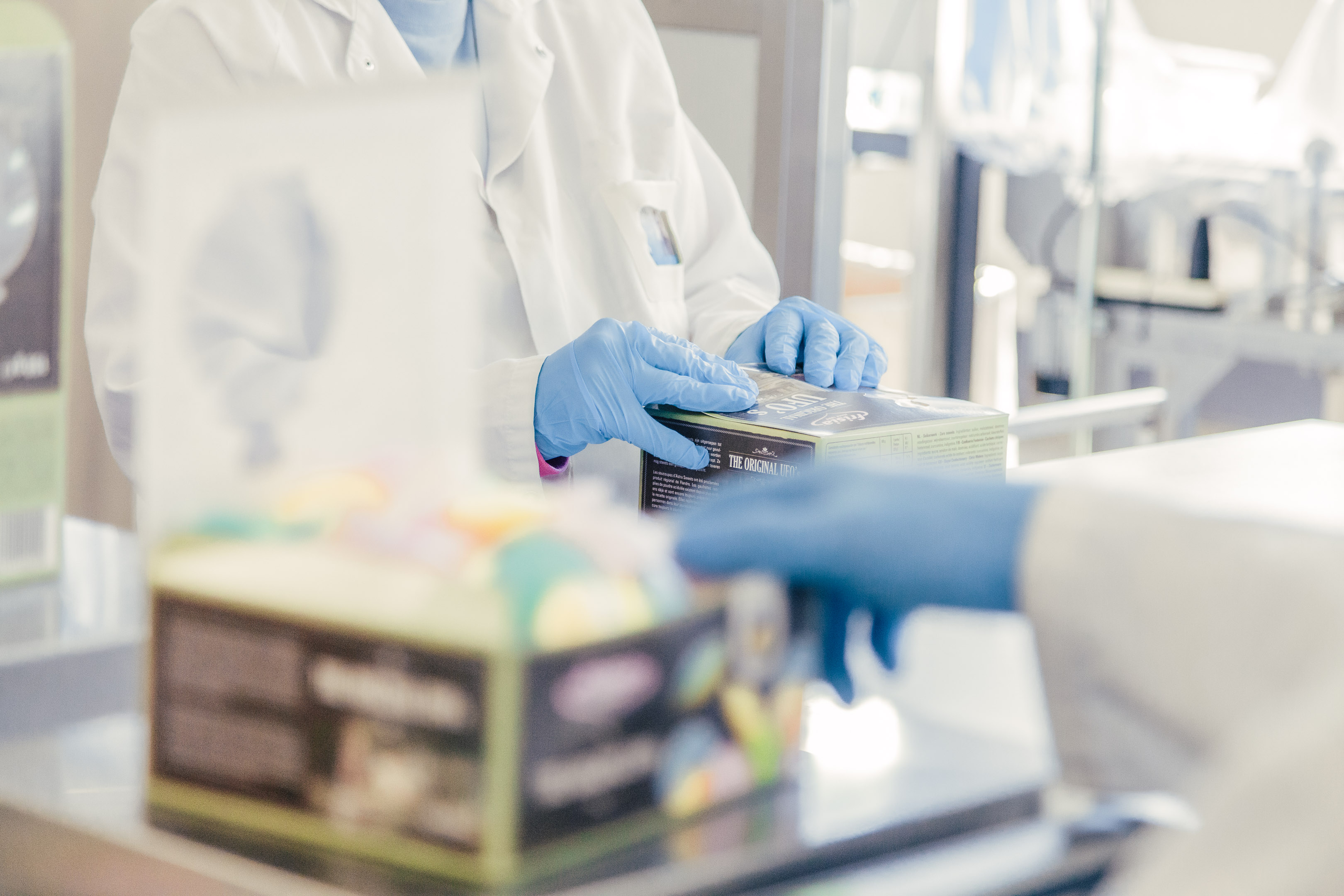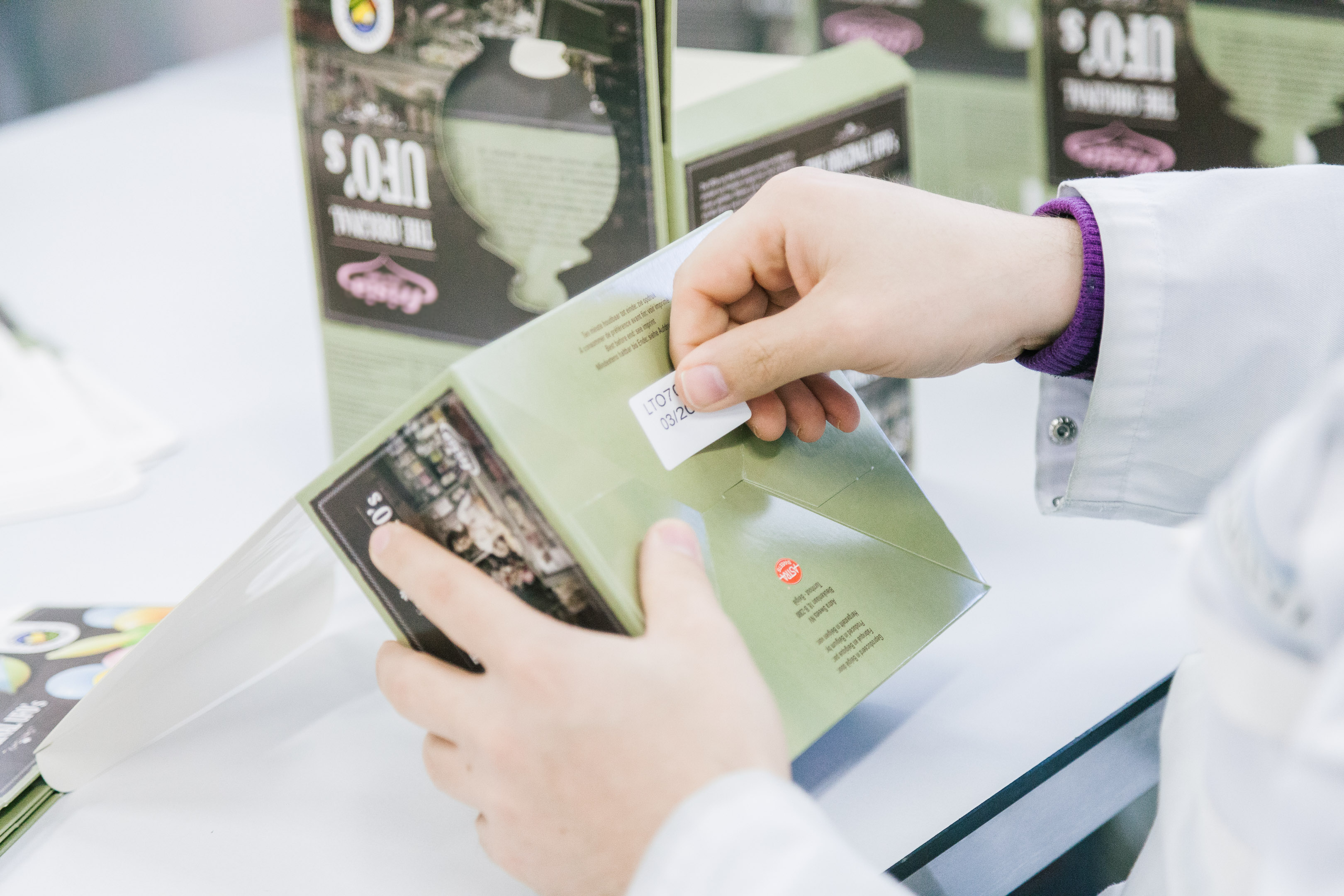
"At A-kwadraat, sweets for export to America are packed, things we cannot integrate into our production flow ourselves."
Bart Van Looy is Operations Director at Astra Sweets, the Turnhout confectionery with a rich history. Being responsible for the production branch in Turnhout, he sees the A-kwadraat team at work every day.
How did you come up with the idea of deploying A-kwadraat employees in your production environment?
Bart Van Looy: “I actually don’t know. It has been the case for years. I have been working at Astra Sweets for over five years now, and as far as I know, it has never been different. After all those years, many personal connections have grown.
At the moment, about ten people of A-kwadraat work with us on site. Another part of the work happens at A-kwadraat’s own sites. In the beginning, all work happened at A-kwadraat. But the transport was so ineffective that we looked for a solution together."
What is happening exactly?
“At our site, we focus on collecting candy. Many supermarkets are our customers. They want boxes of mixed sweets. Since our production process does not allow that to be automated, a team of A-kwadraat makes assortments in one box. In addition, we have all kinds of short-term or seasonal promotions, for which displays have to be composed.
At A-kwadraat, among other things, our UFOs for export to America are packed, and a certain type of tubes are filled, things we cannot integrate into our production flow ourselves.
Such assignments of things we cannot handle ourselves or peaks we cannot cope with alone, we call ‘co-packing’. We have a list of co-pack partners to which we send those orders and they can accept them. Except for A-kwadraat, there are no social enterprises on that list, but we notice that A-kwadraat is competitive in terms of price and quality.
Sometimes correction work is also done. For example, a mix contains green candies that have turned brown. Instead of throwing away the entire batch, we take the brown ones out, remake the green ones, and remix everything. If the deviation is not too big, we prefer to solve it like this.
Every year we take a moment together to see if there are other ways to collaborate."

What is the output?
“I don’t have those numbers to hand. I do know that we produce about 25,000 tons of candies in Turnhout every year. A part of that goes to retail, and A-kwadraat helps with that.
At the beginning of the corona crisis, A-kwadraat didn’t work on site for a while, partly because several employees belong to risk groups. At that point, their importance to us became even more apparent. Retailers sold a lot of candy because people had to stay at home. During the peak, we had to reposition our people. All in all, that was not too bad, because we saw a sudden decline in other segments and we were able to keep everyone at work. But we are still happy that the collaboration was quickly back on track and that everyone was able to take up their own task again.”
How do the contact and the collaboration between your own people and the A-kwadraat team go?
“The employees of A-kwadraat are part of our team. They wear our clothes and have their own locker. They are invited to the staff party, and they have a fixed place in the canteen. Mie, the supervisor who leads the A-kwadraat team with us, knows our company through and through.
In fact, there is little distinction between our employees and those of A-kwadraat. I think our people feel that way too. The team works in our packing hall, but the work itself is stand-alone. Every morning I do a tour of the factory and pass by them as well. And I can testify: the people of A-kwadraat are always friendly and optimistic.
Mie shares an office with our colleagues who make the packing planning. So, they communicate all the time. If there is a need for helping hands somewhere, they ask Mie if she can temporarily relocate someone on her team. Because of this long collaboration, we know what A-kwadraat can do for us. We know what they can and cannot do. Although, I have to admit that there is often no limit. What the people of A-kwadraat can’t do, temporary workers usually can’t do either. The boundary with interim work is no longer sharp.
The evolution from a sheltered workshop to a social enterprise is very striking. In the past, they may have been looked at as outsiders and their work as occupational therapy. Now it’s about valuable services and real partnerships. In Turnhout, that is certainly the merit of A-kwadraat, the director and the Board of Directors: they insisted on integrating employees into other companies, and they succeeded. A company like Janssen Pharmaceutica is also a good example of this.”
What is the added value of a partner like A-kwadraat for you?
“The way they give meaning to the war on talent, which is very important today. It is no longer easy to find good people. A partner like A-kwadraat can qualitatively perform a certain type of tasks. The alternative would be not to do certain things or have them done in low-wage countries. Social partnerships ensure that a certain aspect of our production process can be done nearby. That is sustainable and logistically interesting.
Another added value is their logistic department. A-kwadraat organizes itself according to the needs of the customer. For example, they converted our machines to match their way of working. They see those opportunities. Entrepreneurship is in their corporate culture.
What they do is so complex. A human remains the best automation. Accuracy is typical for social enterprises. That is something I recognize at A-kwadraat. The work is carried out correctly, without any deviation from the standard. Our people are not able to do that with monotonous work.
When it comes to sustainability, A-kwadraat is an example for us. We want to focus more on it in the future, but it is not yet at the top of our agenda. That is the case with A-kwadraat, sustainability comes up in every conversation, which is inspiring."
